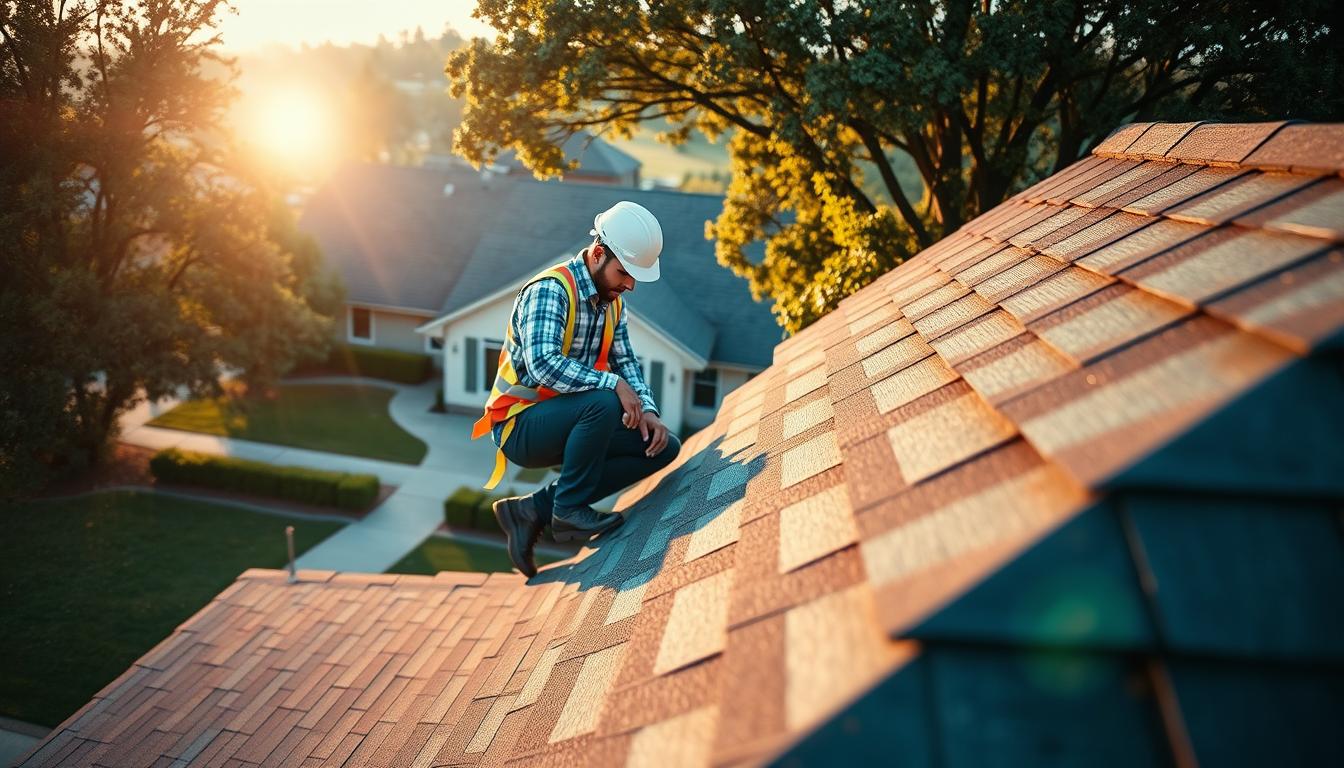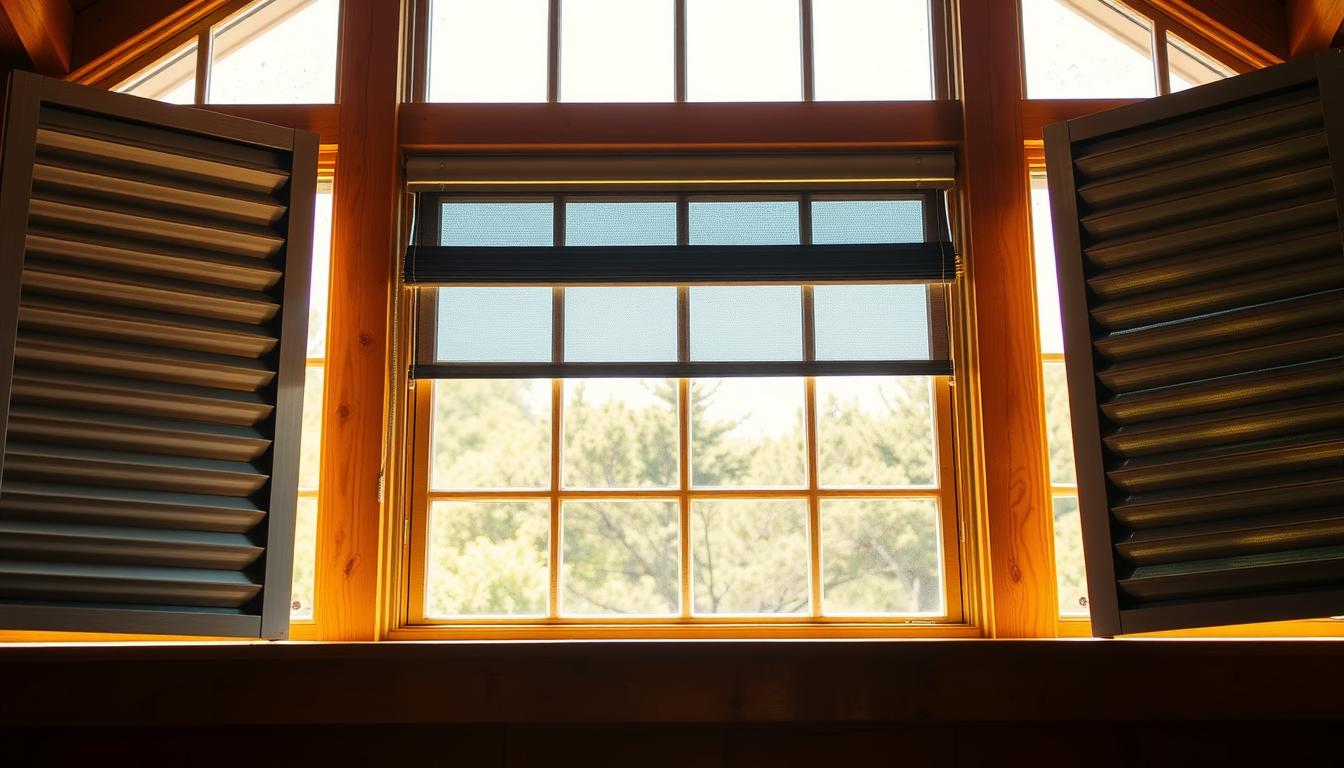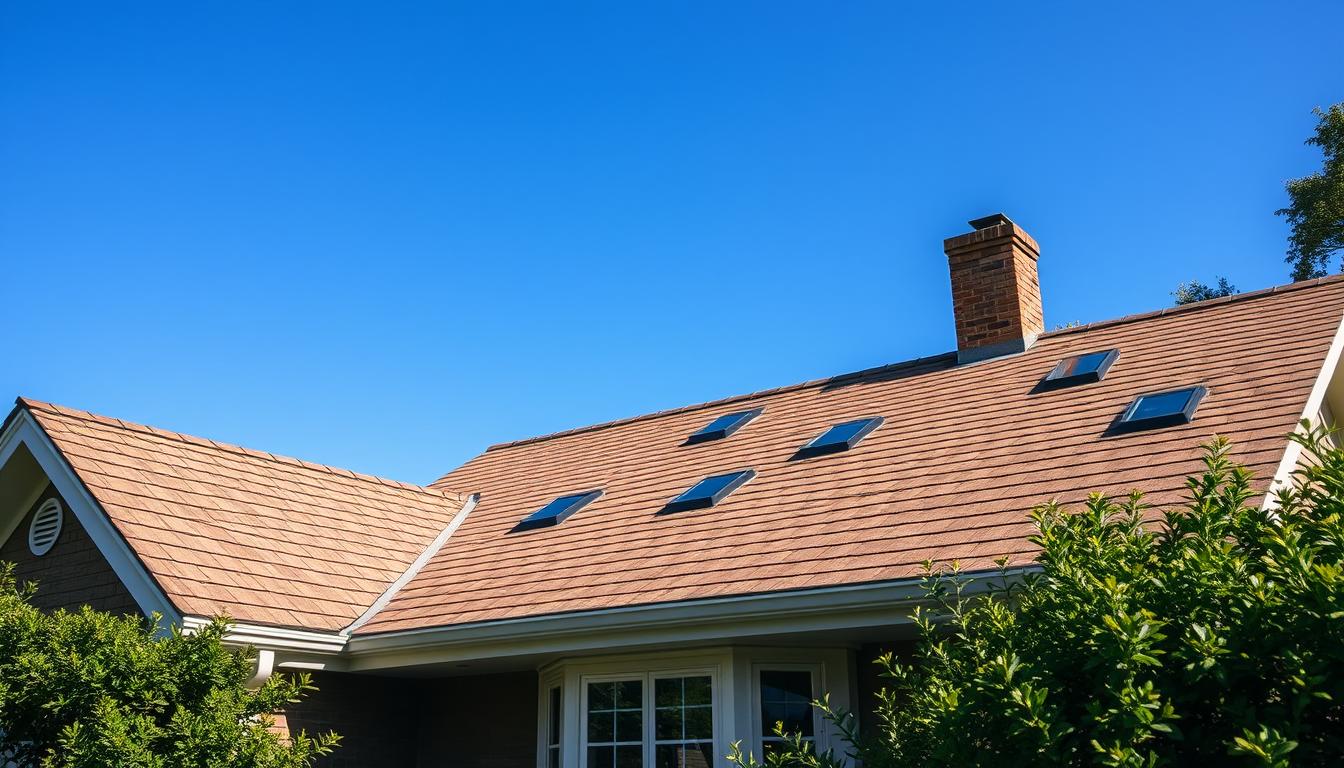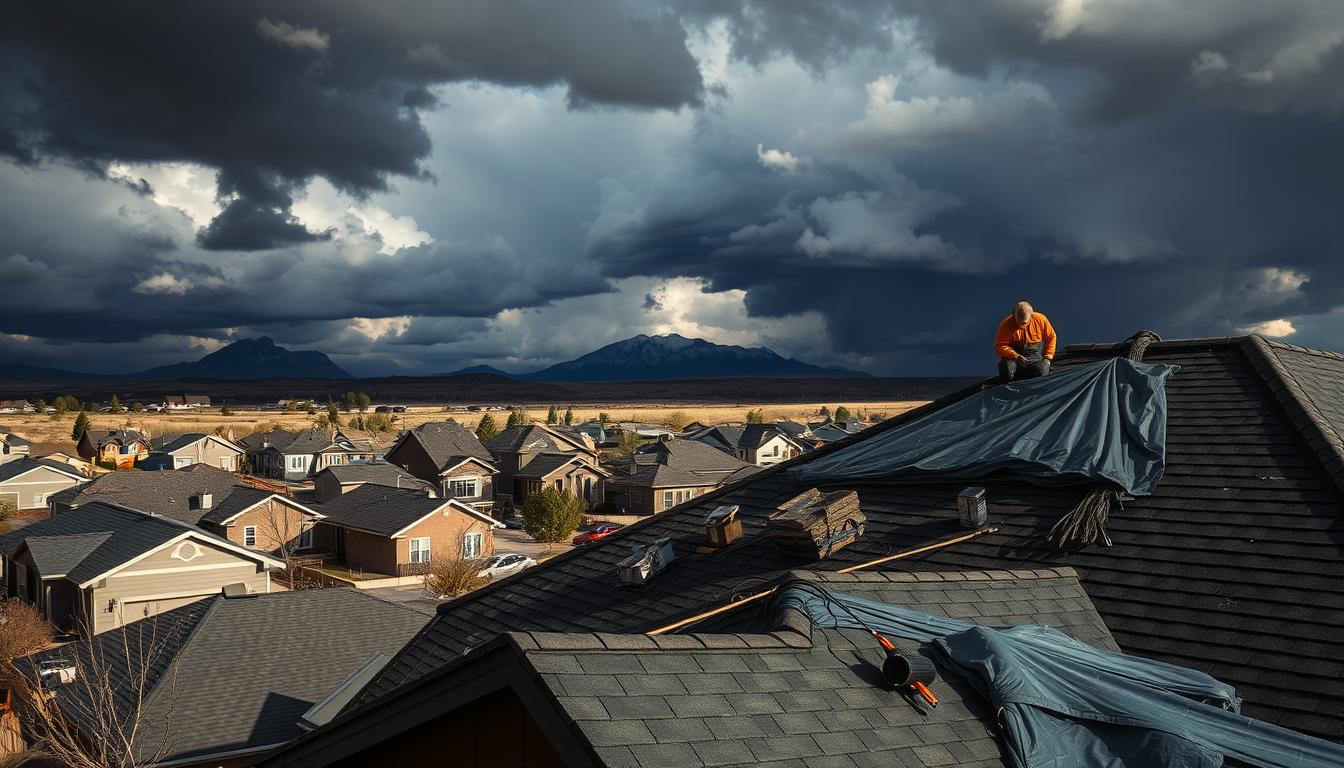In today’s economy, homeowners need to watch out for dishonest contractors. These scammers might overcharge or claim they fixed things that weren’t broken. They might even pretend to be real workers and then vanish with your money.
Inspectors often catch these scams early. The Better Business Bureau says a common trick is asking for a big chunk of money upfront. Some places have laws to stop this, limiting how much you can pay before work starts.
Scammers might also skip getting the right permits, especially for small jobs. They might say they found hidden problems to raise the price. Some companies offer cheap leftover materials, but the quality and risks can be unknown.
Key Takeaways
- Scammers might overcharge, fix unnecessary items, or pretend to be real workers to take advantage of homeowners.
- Scams include asking for a lot of money upfront, skipping permits, and finding fake problems to raise prices.
- Be cautious of unsolicited offers, unlicensed contractors, and deals that seem too good to be true.
- Checking contractors and getting clear agreements can protect you from scams.
- Inspectors are key in stopping construction scams.
Roof Scams and Storm Chasers
Homeowners need to watch out for roof repair scams, especially after natural disasters. Roofing storm chasers travel from place to place, looking for homeowners with damaged roofs. They offer cheap fixes and may show up unexpectedly, saying they worked on your neighbor’s roof.
Identifying Roof Repair Fraud
Be cautious of roofers who assess your roof from the ground without a full check. They might say you need a new roof when a simple fix is enough. Some scammers even cause more damage to increase the cost.
- Roofers who charge much less than local contractors are probably storm chasers.
- Good roofers get business from referrals, not from aggressive sales tactics.
- Storm chasers often ask for upfront payment and try to pay your insurance deductible.
To avoid roof repair scams, do your homework, get several quotes, and work with your insurance company. Don’t fall for quick offers or high-pressure sales. Make sure you choose a reliable, local contractor who offers quality work at a fair price.
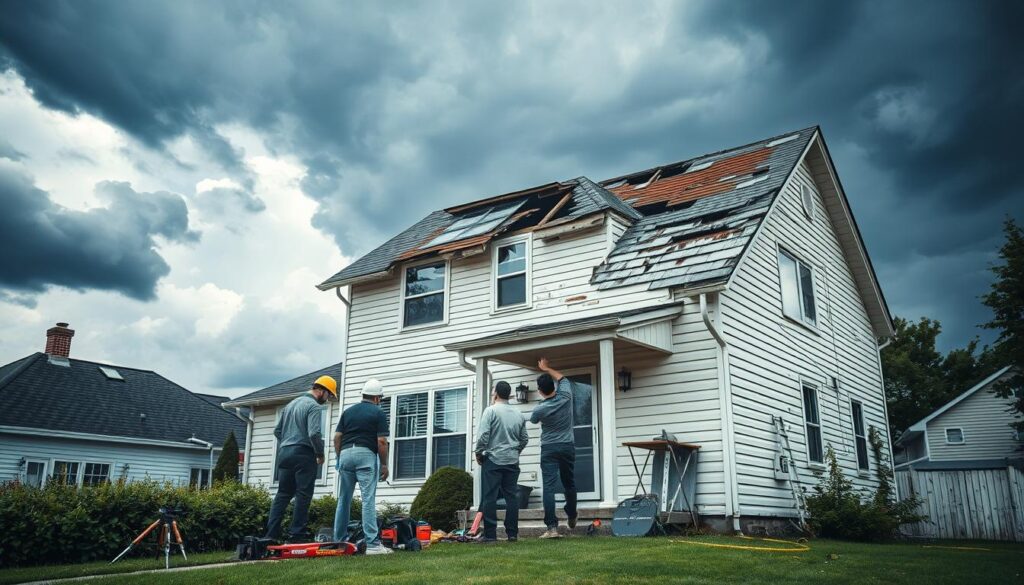
Driveway Sealing Cons
One common driveway sealing scam is when a contractor offers to seal your driveway cheaply. They claim to use leftover sealant from a nearby job. But, this sealant is often just paint or another cheap spray that won’t last.
Another driveway resurfacing fraud trick is when contractors say your driveway needs a full resurfacing. But, it might just need a simple seal. They take advantage of homeowners who don’t know how to care for their driveways.
To avoid these cheap driveway sealant scams, do your homework. Look for trusted local contractors and get several quotes. Also, check the materials they use. Asphalt driveways can last up to 25 years with the right care. Concrete driveways need sealing every year to look good and last long.
- Beware of contractors offering unbelievably low prices for driveway sealing or resurfacing
- Ensure the sealant being used is of high quality and appropriate for your driveway material
- Trust experienced, licensed professionals for driveway maintenance and repairs
- Regularly maintain your driveway, whether it’s asphalt or concrete, to extend its lifespan
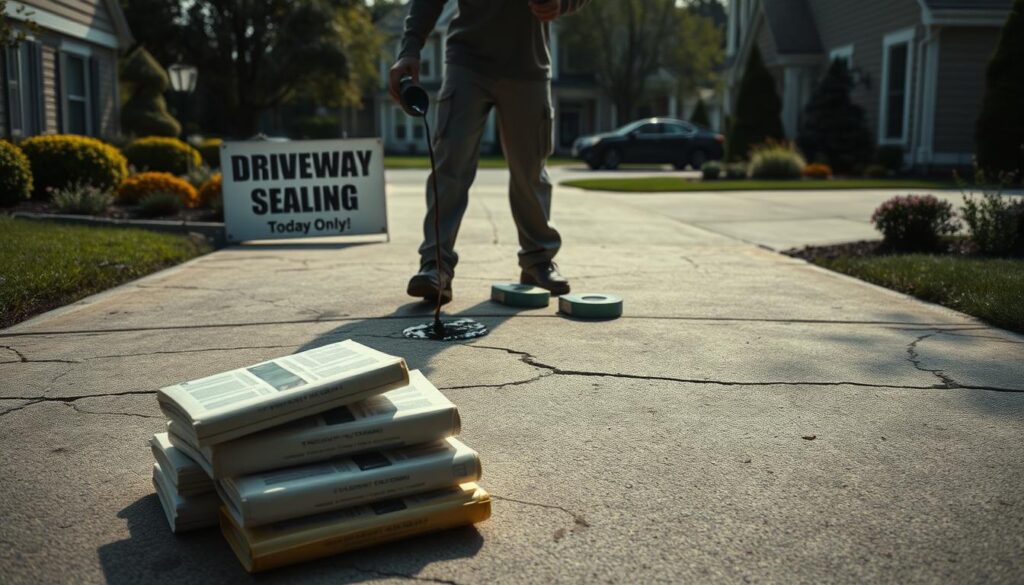
Stay informed and watch out for driveway sealing scams. This way, your driveway will stay in great shape for many years.
The common construction rip-offs of Termite Treatment
Termite treatment scams are common in construction, tricking homeowners into unnecessary treatments. Experts say the annual termite bond fee is about $270. But, the actual treatment can cost up to $1,500. This price gap makes some termite treatments seem suspicious.
Signs of Termite Treatment Fraud
Termite inspection fraud is more common than it should be. Homeowners need to be careful during construction. Scammers might show fake termite damage or offer poor fumigation services.
To avoid scams, get a second opinion and research termite treatment providers well. This way, you can avoid unnecessary costs and ensure your construction project is done right.
- Exterminator showing you termites on a fence or woodpile not connected to the house
- Claims of witnessing “evidence” of an infestation without actually showing it to you
- Significant discrepancies between the cost of a termite bond and the actual treatment
- Wide range of pricing for termite bonds based on location and service provider
Report termite inspection fraud to the Better Business Bureau, police, and local newspapers. This helps stop others from getting scammed. Being informed and proactive can save you from costly termite treatments and ensure your construction project is done right.
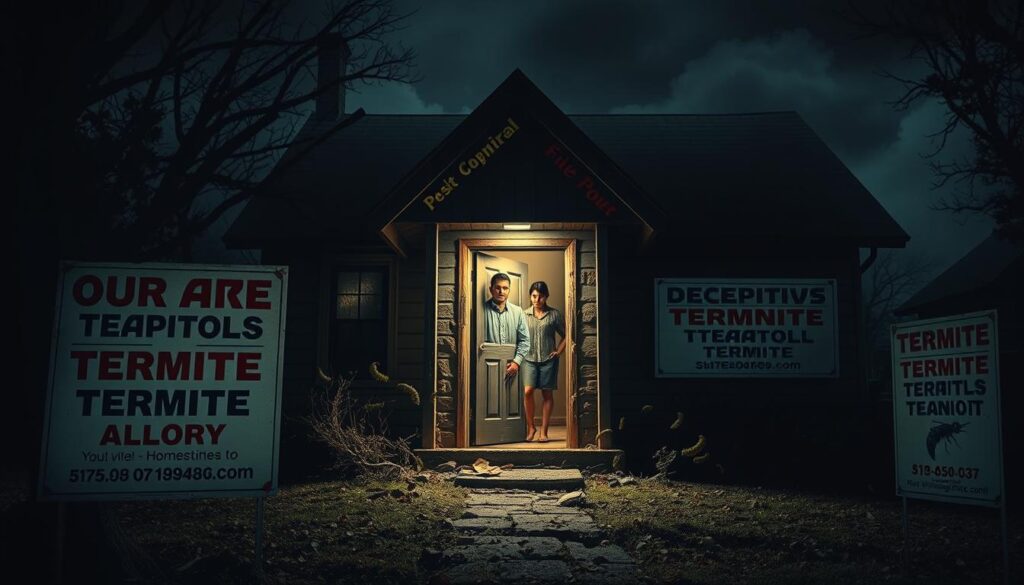
Chimney Sweep Scams
Homeowners, beware! The chimney sweep industry is full of scams. Scammers show up unannounced, offering cheap chimney cleaning services. But, these deals often lead to high, unnecessary repair costs.
Experts say no honest chimney sweep service should cost less than $350 in eastern Massachusetts. Yet, some companies offer $99 sweeps and free inspections. These offers are a common scam tactic to trick homeowners.
- Scam chimney companies often change their names and vehicle looks to avoid the law.
- In Wellesley, MA, a homeowner was quoted $49 for a sweep but got a $2,000 bill for little work.
- Lawmakers have warned about chimney sweep fraud, which includes pushy sales and door-to-door visits.
To avoid chimney sweep fraud, research any contractor well before hiring them. Watch out for very low prices, upfront payment demands, and scary claims about your chimney. Always get a second opinion from a trusted, licensed chimney sweep.

If you think you’ve been scammed by a chimney sweep scam or other scams, report it. Tell your local authorities or the Attorney General’s office. Stay alert and informed to avoid these scams.
HVAC and Plumbing Overcharging
Homeowners need to watch out for scams and overcharging in HVAC and plumbing services. HVAC repair scams might replace working parts or use old parts instead of new ones. Plumbing overcharging could mean using cheaper materials or smaller pipes to make more money.
To stay safe, ask to see broken parts before they’re replaced. Also, ask for proof of new parts and documentation for the work. Be careful of plumbers who only want cash and don’t provide proper paperwork.
The cost of R-22 refrigerant, or Freon, is going up. This can make HVAC repairs very expensive, sometimes over $1,000. Be cautious of contractors who suggest big units. This can cost more upfront and lead to higher maintenance costs later.
To protect yourself, get a second opinion on expensive HVAC jobs. Read reviews of local contractors and make sure you have a written agreement. Asking for proof of repairs can also prevent scams and unnecessary work.
By staying informed and careful, homeowners can avoid common scams and overcharging in HVAC and plumbing.
Painting Contractor Deceptions
Home renovations can sometimes lead to scams by painting contractors. They might promise to use high-quality paint but use cheaper alternatives instead. This can make the paint job last less long and cheat homeowners out of what they paid for.
Some contractors also skip important prep work to save money. This includes not cleaning surfaces well, skipping priming, and not sealing properly. These steps are key for a good finish that lasts. Homeowners who don’t watch out might end up with bad work that needs fixing or redoing.
To avoid these scams, homeowners should carefully choose their painter. They should check references and make sure the contract is clear. This way, they can avoid falling into common painting contractor scams.
FAQ
What are some common construction rip-offs that homeowners should be aware of?
What are some of the most common contractor scams?
How can homeowners spot roof repair fraud and storm chasers?
What is a common driveway sealing scam?
How can homeowners identify termite treatment fraud?
What are some common chimney sweep scams?
How can homeowners protect themselves from HVAC and plumbing overcharging?
What are some painting contractor deceptions to watch out for?
Source Links
- https://www.houselogic.com/remodel/budgeting-contracting/top-5-contractor-scams-and-how-avoid-them/
- https://www.nachi.org/home-repair-rip-offs.htm
- https://www.on-sitemag.com/construction/10-most-common-construction-fraud-schemes/1002152190/
- https://www.visexterior.com/blog/avoid-roofing-scams-local-roofers-vs-storm-chasers
- https://www.fbfs.com/learning-center/post-storm-insurance-scams
- https://www.mdpavingpros.com/asphalt-sealing/
- https://todayshomeowner.com/driveway/guides/pros-and-cons-of-sealing-concrete-driveway/
- https://news.allcongroup.com.au/5-common-concrete-sealer-problems-and-how-to-solve-them
- https://www.bogleheads.org/forum/viewtopic.php?t=169869
- https://www.streetdirectory.com/etoday/be-careful-of-termite-inspection-fraud-uwlcuc.html
- https://www.chimneysavers.com/chimney-scam.html
- https://www.doj.state.or.us/media-home/news-media-releases/scam-alert-chimney-cleaning-scams/
- https://todayshomeowner.com/plumbing/guides/plumbing-scams/
- https://www.servicelegends.com/8-common-hvac-repair-scams-to-avoid/
- https://www.networx.com/article/four-ways-a-contractor-could-rip-you-off
- https://www.constructionwitness.com/published-articles/contractor-construction-fraud/contractor-fraud-series-part-1-dont-become-a-vic/
- https://www.justia.com/consumer/deceptive-practices-and-fraud/home-construction-repair/


